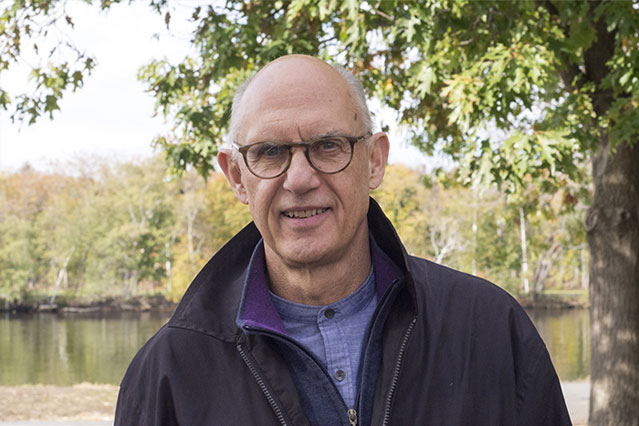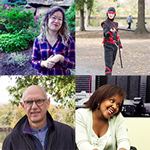Faces Behind the Screen: Stu
Quick Links
<< Return to all “Faces Behind the Screen” stories
Imagine that a famous musician like Miles Davis, Joni Mitchell, or John Lennon had suddenly lost their hearing early in their careers. How would they be able to make music if they couldn’t hear themselves or their band playing or singing? Would they ever play music again or would we just live in a world without the Beatles?
These are the questions one might ponder after meeting someone like Stu, a successful musician who suddenly lost his hearing in the late 1970s and had to abandon his musical pursuits.
We spoke with him at the New England Walk4Hearing event in Boston in Fall of 2016.
Where in your career were you when you started to lose your hearing from SNHL (sudden sensorineural hearing loss)?
I had two records in the top 100 on the charts, and I had a number one record in Brazil.
And I was singing radio and television jingles in New York City, did some writing for Disney, and then, boom, boom…. [both ears lost hearing] over the course of a year and a half. No music for 35 years.
How did your SNHL start to affect your work?
I was in the recording studio doing a jingle for a commercial with a vocal group, and I suddenly could not hear very well on one side. And when you’re in the studio, you’re wearing headphones and you’ve got your own voice in one side and the music and ensemble [on the other side]. I was losing touch with that side and people were beginning to notice I was losing pitch.
I went home that day or soon after and woke from a nap and stood up off the bed, and suddenly an air horn, like on a boat, went off in the left ear. While there was no diagnosis at the time, it was probably a blood vessel bursting.
“…They gave me steroids and that was it. Got into a hearing aid and I lived like that for the last 35 years. Different technology [back then].”
What was the treatment regimen for SNHL in the 1970s when you lost your hearing?
…They gave me steroids and that was it. Got into a hearing aid and I lived like that for the last 35 years. Different technology [back then].
How has the scientific understanding of hearing loss changed since then?
What was discovered is that the brain hears and essentially the ears are the conduit and contain all the hearing mechanisms. Not hearing is more complex than the ears alone.
Today, in fact, my hearing audiogram is identical to what it was 40 years ago but my brain has enabled me to have a better hearing experience, so I’m able to make more sense out of sound, especially speech. And because of that, I’m better able to sing and play and perform again, so it’s quite amazing but still very challenging.
Ho has hearing aid technology changed since then?
Hearing aid technology has started to open up the frequencies, so I’m able to hear a broader range of tones than I could with earlier hearing aids that were focused only on speech. So, now I was suddenly able to hear musical tones I hadn’t heard in a very long period of time.
What else did you do to help yourself get back into making music?
The [other] critical thing was vocal lessons– going back to take voice lessons and understanding how hearing was very much physical and internal.
…Doing vocal and breathing exercises has really helped to coordinate my hearing with my voice and my body in ways that I had forgotten and never expected.
“A year ago this weekend, I started performing live again for the first time in 35 years.”
A year ago this weekend, I started performing live again for the first time in 35 years. And since mid-February I have been in the studio recording new music for the first time in 40 years with a plan to re-emerge musically in that world.
How do you combine hearing aid technology and technology in the recording studio to perform at your best?
The digital technology has come in …and in many ways it’s terrific. But, there are experts in music who are saying that the old analog hearing aids might in some circumstances be better for music than some of the new digital hearing aids. So, I’m experimenting with a series of tech adjustments.
Dr. Brian Fligor in Mansfield, MA had a set of ear monitors customized for me from Sensaphonics in Chicago. The right ear monitor is a hearing aid and the left is called the CROS, which picks up sounds and wirelessly sends it to the right ear, my hearing ear.
…I can’t wear a set of headphones in the studio because my hearing is too dull. With the monitors, it boosts the volume like a hearing aid does. I’m able to hear, sing into the microphone, and record as well.
Dave Matthews and other artists are starting to use that on stage because they’re no longer using loud monitors and speakers — that’s what blew everybody’s hearing out. When you’ve got ear monitors, you’re able to control what it is you’re hearing.
So, Dave Matthews might say, give me a little guitar, give me a little piano and drum. That’s all I want. I don’t want anything else in there.
“Being visible again is really a wonderful thing…”
How else has this hearing renaissance changed your life?
I’m also an actor. And I’ve been in studio and independent films, videos and commercials and voice recordings, commentaries and live stage performances. I let much of that go many years ago, and I may pick that back up again and start getting at it.
I think that it’s very important for us, too, with hearing loss, that we all learn eventually that many people endure our challenges. Some 1 in 7 worldwide — it’s not just us. There is strength in solidarity in the hearing loss community…
We’re not just another “disabled” group that’s off in the corner somewhere trying to survive. We all have lives like anyone else… And it’s wonderful to be here today at the Walk4Hearing to see and hear everything that’s going on the many people that are supporting that.
Some of the toughest situations are actually for people who live with (and love) those with hearing loss — couples and families, parents that have children that are born with hearing loss, or adults that suddenly lose their hearing and can no longer communicate with their own children well. So, I’m grateful for whatever we have right now.
“We’re not just some disabled group that’s off in the corner here. We all have lives.”
Do you have advice for people out there who are struggling with hearing loss?
I suffered what was called a sudden sensorineural hearing loss. We now know that this is a medical emergency like a stroke or something else, because if it’s not addressed very quickly, [your hearing’s] gone. So, if you notice a sudden loss, get to a doctor right away. Don’t wait.
The second thing is that too many folks are letting their hearing loss be the end of the story. If you broke a leg or had a knee replaced, you would have physical therapy. People need to know about aural rehabilitation, literally rehabilitating your hearing. It works, it happens, it’s there. Very few people are engaged in doing it.
Find somebody that does aural rehabilitation. I personally recommend Dr. Geoff Plant here in Somerville. It’s a great thing for Bostonians [with hearing loss].
I also tell people with hearing loss to sing. One of the things that often happens to us is we lose music. It’s gone or it’s discombobulated, and we can’t understand it. Or we can only understand the music that we remember. Or there are certain tones and frequencies we get, but we don’t get the others.
What I’ve learned through aural rehab is that the brain can help you get some of that back if not a considerable amount. Not because your hearing is going to improve, but because the brain is going to be able to help you fill in some of the gaps. It’s almost kind of like virtual hearing that the brain allows you to negotiate.
Maybe even get a vocal coach — because singing gets music back into your body. We know that music has emotional and psychological resonance as well. I didn’t listen to music for years. I just started in the last year or so listening to music again, even music that I didn’t know. And it’s given me back many things in return.
Singing also stimulates the parts of the face, jaw, mouth, and palette that seem to open things up for hearing and vocalizing. Yes, sing in the shower without your hearing aid and let ‘er rip!
…For people with hearing loss, that dullness when you take your hearing aid out can be tough. Sing with your hearing aid out. Listen with your hearing aid out. And just listen to what you can.
Stu told us to keep in touch, left to change his hearing aid battery, and then got up on stage to sing the national anthem in front of the crowd.
NOTE: This page was originally published on 1/24/2017 and was updated 1/12/2018.
Thank you to the Hearing Loss Association of America (HLAA) for hosting this series of interviews at the New England Walk4Hearing.
Faces Behind the Screen is a storytelling project focusing on members of the Deaf and hard of hearing community.





